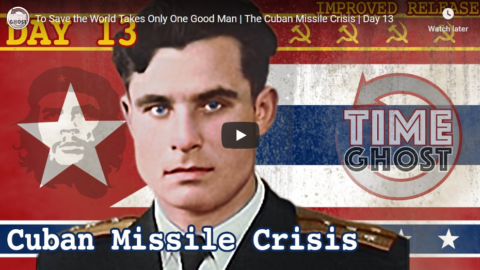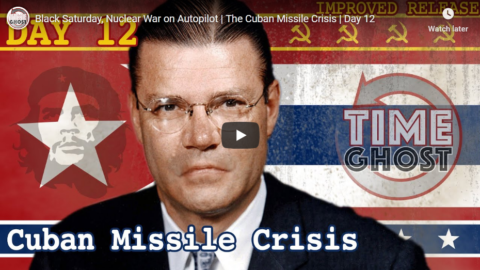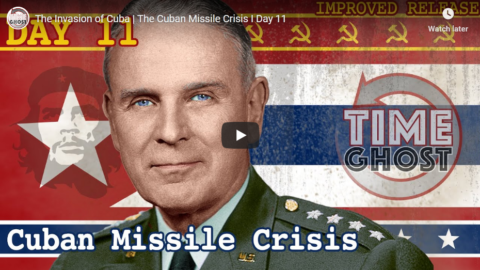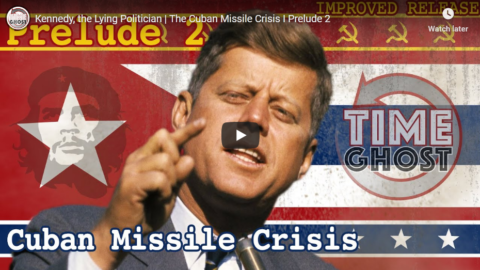TimeGhost History
Published 19 Jul 2020On Sunday, 28 October, 1962 the Cuban Missile Crisis comes to an end to end all things, and almost everything. Only one young man, Vasili Arkhipov will stand between humanity and nuclear armageddon.
Join us on Patreon: https://www.patreon.com/TimeGhostHistory
Hosted by: Indy Neidell
Written by: Spartacus Olsson
Director: Astrid Deinhard
Producers: Astrid Deinhard and Spartacus Olsson
Executive Producers: Astrid Deinhard, Indy Neidell, Spartacus Olsson, Bodo Rittenauer
Creative Producer: Joram Appel
Post-Production Director: Wieke Kapteijns
Research by: Spartacus Olsson
Edited by: Daniel Weiss
Sound design: Marek KaminskiColorizations:
– Carlos Ortega Pereira (BlauColorizations) – https://www.instagram.com/blaucoloriz…Sources:
http://www.jproc.ca/crypto/hotline.htmlSoundtracks from Epidemic Sound:
– “Cold Eyes” – Elliot Holmes
– “From the Depths” – Walt Adams
– “Moving to Disturbia” – Experia
– “When They Fell” – Wendel Scherer
– “Under the Dome” – Philip Ayers
– “Scope” – Got Happy
– “Symphony of the Cold-Blooded” – Christian Andersen
– “City Night Lights” – Elliot Holmes
– “Secret Cargo” – Craft Case
– “Too Young for This Shirt” – Elliot Holmes
– “Juvenile Delinquent” – Elliot Holmes
– “Drifting Emotions 3” – Gavin LukeArchive by Screenocean/Reuters https://www.screenocean.com.
A TimeGhost chronological documentary produced by OnLion Entertainment GmbH.
From the comments:
TimeGhost History
59 minutes ago (edited)
When we recorded this the first time, we didn’t have the chance to release these day by day. It took us almost half a year from when we had the idea until the last episode came out. We still felt that it was a revelation to see it chronologically. For me as writer it was in any case a deep dive into a story that I thought I knew, but rediscovered by reassembling the source documents in the exact order things happened. I learnt new aspects and gained an incredibly more detailed understanding of both the events and the people involved. But today, on Sunday July 19, 2020 it is the fourteenth day that both Indy, Astrid and I watch the remade episodes completed as they are released every day, I haven’t even watched this last episode yet, and even though I know exactly what is going to happen, I’m excited. This is crazy, crazy stuff.And now, the three of us are sitting in the garden in Bavaria preparing to shoot the next months shows. And when we look back and talk about it it we’re all so glad that we got the chance to make this even better. Astrid could go full out on the set, and do even more with Indy’s costume. We had fun adding drama with the light. Indy make the delivery even better by changing the tenses to the present and altering the script slightly so that it felt more immediate. But perhaps more than anything, we could get more, better archive, get our editors added touch, and rethink the music score so that it was more consistent and period appropriate.
We also want to take this moment to thank:
The TimeGhost Army – it is your membership that enabled us to improve to this level from 2017 until now – you are the souls of TimeGhost.
Wieke, who directed the post-production and put his personal flair into it – especially grateful for the choice of music.
Daniel and Karolina who did a fantastic job on the editing.
All of our colorizers that made the portraits come alive in technicolor splendor (OK, OK… RGB splendor, but same, same)
Marek who sound engineered and made it sound so much better than what I managed in the first round.
Joram who made sure that we had all the publishing in order so that it worked day by day.And all of the rest of the TimeGhost team that as usual had their hands full with this and all the mad stuff we do.
For Astrid, Indy and myself,
I’m Spartacus.







